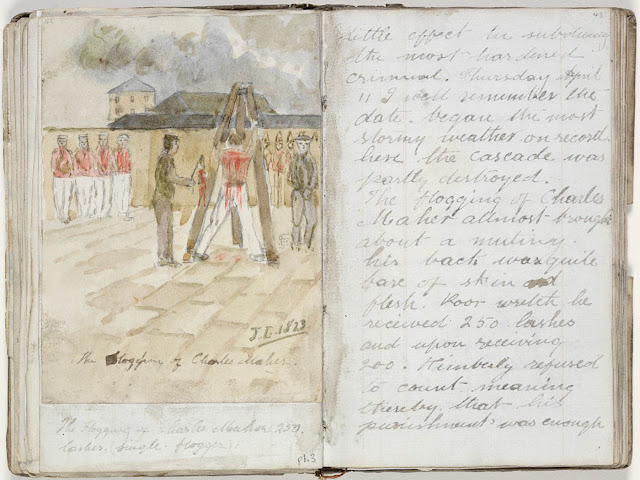arrived in Van Dieman's Land 28th May 1833
Van Diemen's Land was the original name used by most Europeans for the island of Tasmania, part of Australia. The name was changed from Van Diemen's Land to Tasmania in 1856.
all things relating to William's arrival are documented are here
Convicts were a source of labour to build roads, bridges, courthouses, hospitals and other public buildings, or to work on government farms
Assignment
As expected William & other prisioners would be assigned to do jobs according to their skills.William was a Labourer and Stockman very likely he was assigned a job using these skills..according to the below document he was assigned as Labourer.
 |
copied from the booklet "tangled threads"
The weekly ‘ration’
The convicts were allocated a weekly food allowance, or ‘ration’ which was set by the government . The ration components altered from time to time, but records show that the convicts living at the Hyde Park barracks between 1819 and 1848 generally received for one week:
7 pounds (3.1 kg) of flour
7 pounds (3.1 kg) beef OR 4 pounds (1.8kg) pork *
3.5 pounds (1.6 kg) maize (corn meal)#
1/2 pound (225 g) of salt
1 pound (455 g) of sugar
1/4 pound (110 g) tea
The daily diet
The superintendent would divide this up so that each day the convicts were given 450 g bread, 450 g meat, a cup of maize (corn meal), a couple of tablespoons of salt, 1/4 cup of sugar, and 15 g tea. The convicts were given two meals a day – breakfast at daybreak, before marching off to wherever they had to work, returning for dinner, which was taken in the middle of the day. The meals were cooked in the barrack’s kitchens, located in the middle of the ‘mess’ halls, or dining rooms.
- The flour was baked into bread, made by convict bakers at the barracks own bakery, on the northern side of the barrack’s compound.
- Because there was no refrigeration when fresh meat was available it had to be cooked very quickly or it would spoil. Alternatively the meat was salted – like today’s corned beef or pickled pork. Pork, which was richer and fattier was issued at a lesser rate of 4 pounds (1.8 kg) per week. The meat was cooked into soupy stews with whatever vegetables were available.
- Maize is made from corn, which grew in abundance in the early colony and was very cheap. The convicts ground the corn on the dreaded treadmill to make it into cornmeal, a bit like polenta. It was made into ‘hominy’, a type of porridge or gruel for breakfast, with sugar and salt added to make it palatable. If wheat flour was in short supply it was used for bread.
- When compared to a 2 g tea bag today, 15 grams would make almost 2 litres of tea! It would be served black, with some of the days allocation of sugar.
- The ration was supplemented with vegetables that were grown by the convicts in their kitchen garden or could be bought cheaply at the market – generally cabbage, turnips and onions.
Crime and punishment
Convict discipline was invariably harsh and often quite arbitrary. One of the main forms of punishment was a thrashing with the cat o’ nine tails, a multi-tailed whip that often also contained lead weights. Fifty lashes was a standard punishment, which was enough to strip the skin from someone’s back, but this could be increased to more than 100.
Just as dreadful as the cat o' nine tails was a long stint on a chain gang, where convicts were employed to build roads in the colony. The work was backbreaking, and was made difficult and painful as convicts were shackled together around their ankles with irons or chains weighing 4.5kg or more.
During the day, the prisoners were supervised by a military guard assisted by brutal convict overseers , convicts who were given the task of disciplining their fellows.
At night, they were locked up in small wooden huts behind stockades. Worse than the cat or chain gangs was transportation to harsher and more remote penal settlements in Norfolk Island, Port Macquarie and Moreton Bay.
 |
| https://www.sl.nsw.gov.au/stories/convict-experience |
 |
| convict shirt |
William served his full sentence and was released
28th June 1838


